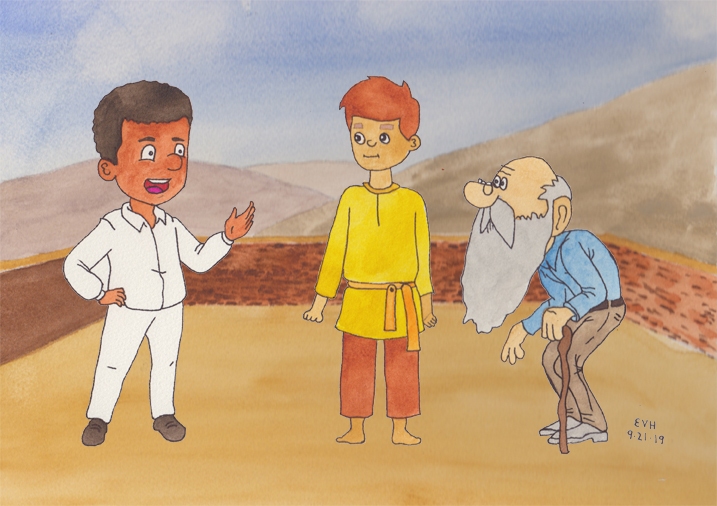
Jataka 166
Upasāḷha Jātaka
The Story of Upasāḷha
as told by Eric Van Horn
originally translated by William Henry Denham Rouse, Cambridge University
originally edited by Professor Edward Byles Cowell, Cambridge University
This is a lovely story whose theme may get a little lost. The Bodhisatta explains to a father and son that death is inevitable unless you perfect the qualities of kindness and virtue.
“14,000 Upasāḷhas.” The Master told this story while he was at Jetavana. It is about a brahmin named Upasāḷha who was particular in the matter of cemeteries.
This man, we learn, was rich and wealthy. But even though he lived next to the monastery, he showed no kindness to the Buddhas and held many wrong views. But he had a son who was wise and intelligent. When the man was growing old, he said to his son, “Don't let my body be cremated in a cemetery where any outcast can be cremated, but find some uncontaminated place in which to cremate me.”
“Father,” the young man said, “I do not know of any cemetery like that in which to cremate your body. Take the lead and show me a place where I can have you cremated.” The brahmin consented and led his son out of the city to the top of Vulture Peak. (Vulture Peak was the Buddha’s favorite place to meditate.) Then he said, “Here, my son, no outcast is ever cremated. Here is where you should have me cremated.” Then he began to descend the hill in his son’s company.
That evening the Master was looking around to see which of his friends was ripe for awakening. He perceived that this father and son were ready to attain stream-entry. So he took their road and went to the foot of the hill like a hunter waiting for his quarry. There he sat until they came down from the top. Down they came, and they saw the Master. He greeted them and asked, “Where are you bound, brahmins?”
The young man told him what they had been doing. “Come along, then,” the Master said, “and show me the place your father pointed out.”
So they climbed back up the mountain. “Which place did you choose?” he asked.
“Sir,” the boy said, “the space between these three hills is the one he showed me.”
The Master said, “This is not the first time, my boy, that your father has been particular in the matter of cemeteries. He was the same before. This is not the only time that he has pointed this place out to you for his cremation. Long ago he pointed out the very same place.” And at his request the Master told them this story from the past.
Once upon a time, in this very city of Rājagaha, lived this same brahmin Upasāḷhaka, and he had the very same son. At that time the Bodhisatta had been born into a brahmin family of Magadha. And when his education was completed, he embraced the holy life. He cultivated the Five Faculties (1) faith, 2) energy, 3) mindfulness, 4) concentration, and 5) wisdom) and the Attainments (jhānas), and he lived a long time in the region of the Himalayas absorbed in meditative bliss.
Once he left his hermitage on Vulture Peak to go buy salt and seasonings. While he was away, this brahmin spoke in just the same way to his son, as now. The boy asked him to point out a proper place, and he came and pointed out this same spot. As he was descending the hill with his son, he saw the Bodhisatta. They approached him, and the Bodhisatta put the same question to them as he did just now, and the son responded as before.
“Ah,” he said, “we’ll see whether this place that your father has shown you is contaminated or not.” He made them go back up the hill again. “The space between these three hills,” the boy said, “is pure.”
“My boy,” the Bodhisatta replied, “there is no end to the people who have been cremated in this very spot. Your own father, born a brahmin, as now, in Rājagaha, and bearing the very same name of Upasāḷhaka, has been cremated on this hill in 14,000 births. On the whole earth there is not a spot to be found where a corpse has not been cremated, which has not been a cemetery, and which has not been covered with skulls.”
He knew this because he had the faculty of recalling previous lives. And then he repeated these two stanzas:
“14,000 Upasāḷhas have been cremated on this spot,
Nor is there the wide world over any place where death is not.
“Where there is kindness, truth, justice, restraint, and self-control,
There no death can find an entrance. There goes each liberated soul.”
(The Bodhisatta is saying that virtue is the path to the deathless.)

Figure: Explaining Kindness as the Path to Liberation
When the Bodhisatta had thus instructed the father and son, he cultivated the Four Excellences (the brahma-vihāras) and was reborn in Brahma’s heaven.
When this discourse was ended, the Master declared the Four Noble Truths. At the conclusion of the discourse the father and son attained stream-entry. The he identified the birth: “The father and son were the same then as they are now, and I was the recluse.”
